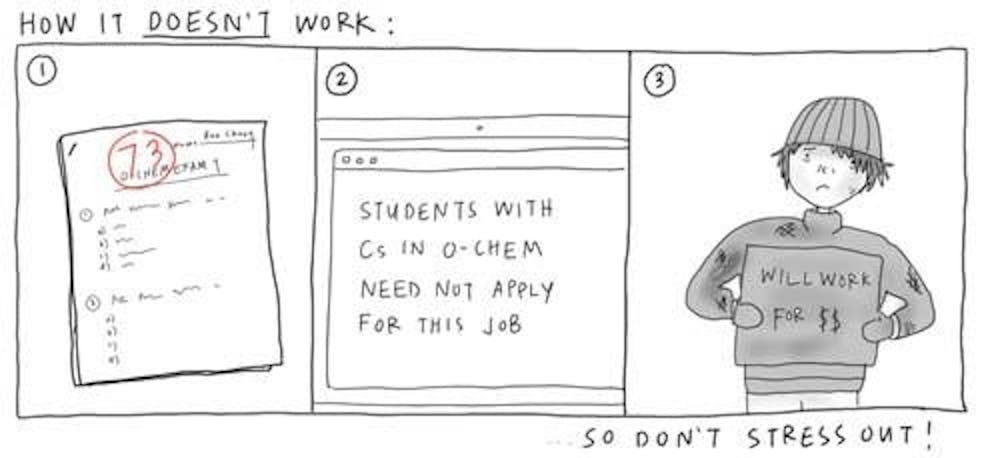After a student in Pennsylvania sues over a C plus grade, UP students discuss GPA stress
(Ann Truong | The Beacon)
By Kelsey Thomas, Staff Writer thomask15@up.edu
When junior biology major Kailyn Kenney sits down to study for a test, anxiety sets in.
"It's like, well if I fail this test then I could fail this class, then I have to take it again and it's going to ruin my GPA and I'm never going to get a job," Kenney said.
As the job market grows increasingly competitive, some students believe grades are more important than ever, and that the difference between an A and a C could determine their future.
"So. Much. Pressure. There is just too much pressure on us," Kenney said.
Senior biology major Elviza Kho said she feels like she has to get close to straight As to get a job or go to grad school.
"It just makes you go crazy," Kho said
Concern over grades drove recent Lehigh University graduate student Megan Thode to sue her school for $1.3 million over a C-plus grade that she says should have been a B. Thode claimed the unfair grade prevented her from becoming a licensed therapist.
Earlier this month, Thode lost the lawsuit, but getting straight A's may not be worth a mental breakdown or a lawsuit. A survey by the National Association of Colleges and Employers (NACE) said employers look at more than grades, and a 4.0 GPA is not necessary to get a job.
Employers considerations
According to NACE, more than 78 percent of employers require a minimum 3.0 GPA, or B average, to be considered for a position. The requirement is a method of filtering out applicants, particularly when the job is posted online and the company is receiving hundreds of applications for a single position.
Employer Relations and Internship Coordinator at Career Services, Max Kalchthaler, said that once a candidate makes it into the applicant pool, the company focuses on skill sets.
"It's like the initial hurdle," Kalchthaler said. "Then employers want leadership. They want you to be able to solve problems and write professional emails."
Kalchthaler said employers will usually choose a candidate with a lower GPA that has a greater skill set and is passionate about what he or she is doing over a 4.0 student who cannot work with a team or does not have the necessary skills for the position.
In some careers, like finance or accounting, GPA may play a greater role in hiring.
However, networking is often more important than GPA in finding a job. According to Kalchthaler, 75 percent of people find jobs through networking.
Kenney said this barely lessens the pressure she feels to get good grades.
"I do believe that networking is more important than the grades you get, but I'm not going to say I haven't lost sleep over there being a C on my transcript from O-Chem," Kenney said.
Kenney plans to take a year off to work after graduation, then continue her education in the health sciences.
Kenney said she is already feeling the pressure of the competition of applying for jobs and graduate school.
"There will always be so many people who are better than you or went to a state school where it was just easier [to get As]," Kenney said.
After graduation, Kho hopes to get a research position in a biology lab. Kho hopes that her skill set will help her stand out when applying for jobs.
"Even though my GPA isn't that good, it doesn't reflect how much of a hard worker I will be or my contributions I can make to the company," Kho said. "I know I can contribute so much more than what my grades say."
Good grades for Grad Programs
Philosophy graduate school hopeful junior Chelsea Welborn said she's begun to realize the grades she receives now will have an impact on her future.
"Their weight is really starting to crash down," Welborn said. "This is a huge deciding factor in the rest of my life. Especially wanting to go directly into a graduate program."
Kalchthaler said GPA is more important to most graduate programs than employers, although it depends on the school.
"They want to see a strong GPA as an indication of your interest in the topic and your dedication to school and your ability to keep it together," Kalchthaler said.
Welborn said having a strong interest in her two majors, philosophy and theology, helps keep her motivated in her upper division classes even when it takes over her social life.
"What I'm doing right now is going to set the stage for the rest of my academic career," Welborn said. "That's a lot more important than getting drunk with people that I probably won't know in three or four years."
And apparently more important than asking a professor for a better grade.
"Any poor grade I've gotten has been overwhelmingly and abundantly clear that it was my fault," Welborn said.
Kenney said she cannot imagine asking for a higher grade, let alone suing UP.
"I would never have the balls to," Kenney said. "I would just feel so uncomfortable."








